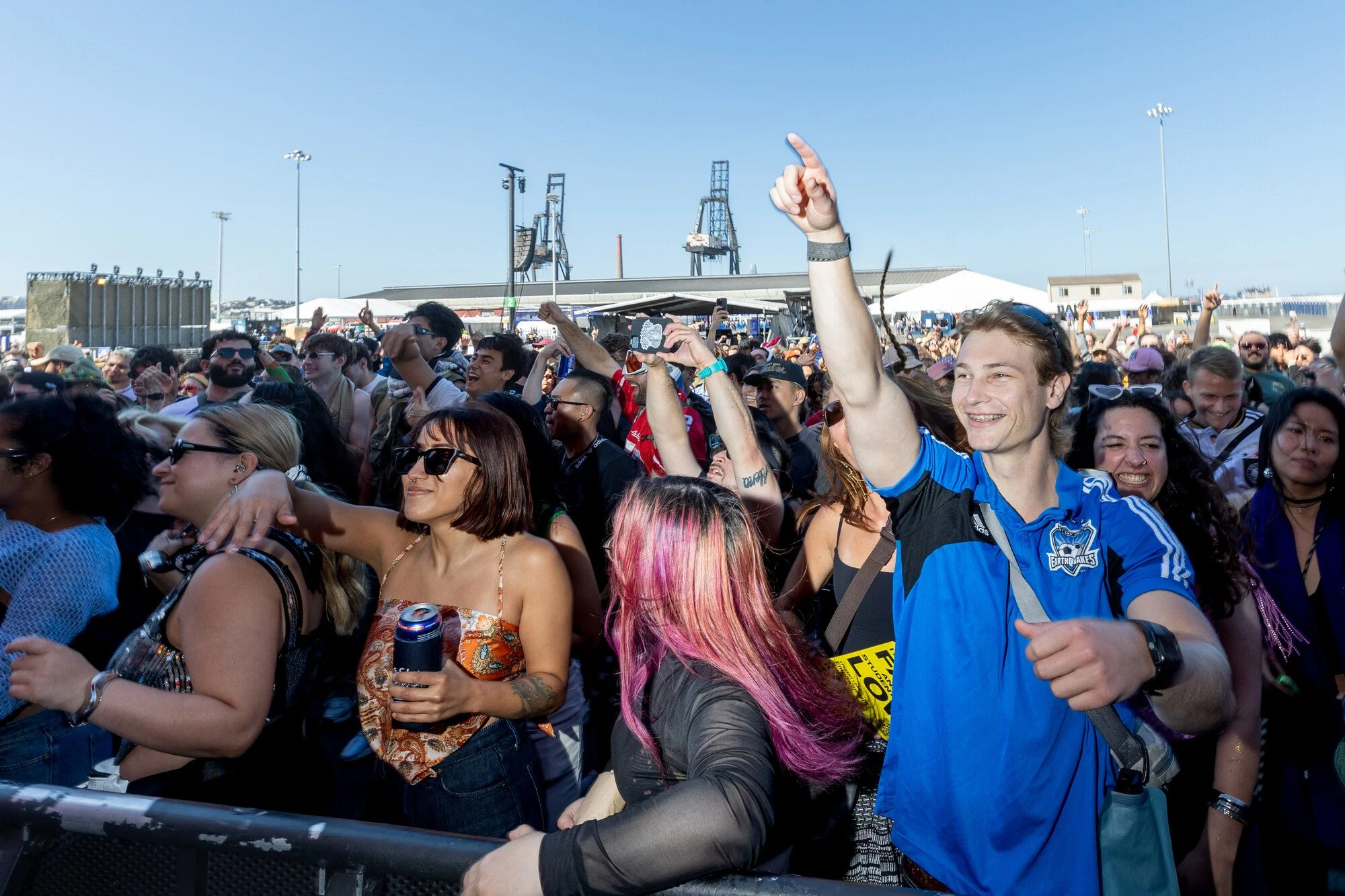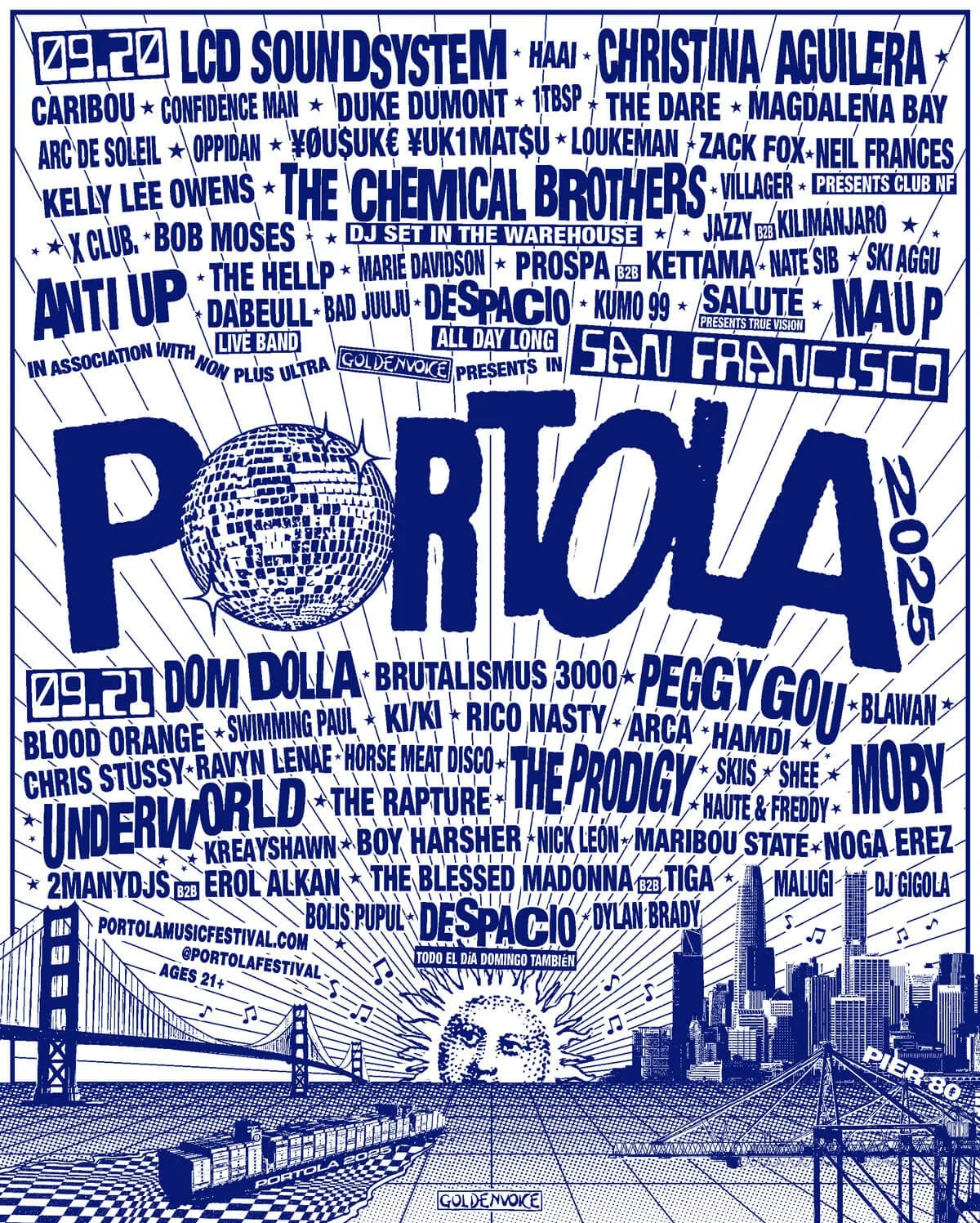How Portola Music Festival’s Marketing Team Builds Hype, Community, and Culture
Photo credit: KQED
When you walk into Portola Music Festival — the energy, the art installations, the crowd, the immersive sound — everything feels intentional. That’s no accident. Behind it all is a marketing team that’s crafted a blueprint for modern music festival promotion: one that blends brand, community, pop culture, logistics, storytelling, and sustainability.
Who’s Leading the Charge
Portola is produced by Goldenvoice, the same company behind massive events like Coachella.
The festival concept came from Danny Bell, VP of Talent Buying for Goldenvoice in San Francisco. He’s been deeply involved not just in curation but in building the festival’s identity from the ground up.
The visual identity & social graphics are often done in collaboration with external creative contractors. For example, Victoria Sarkisian is one contract designer doing social graphics and motion that align with the existing brand guidelines.
Together, the core marketing function seems to combine internal strategy (brand, partnerships, creative direction) with external talent (designers, animators, contractors) — allowing Portola to punch above its weight visually and culturally.
Key Components of Their Marketing Strategy
Here are the moving parts that seem to give Portola its standout presence:
Brand-First Visual & Digital Identity
Portola has a consistent look & feel — striking visual graphics, strong motion content, stage visuals & video content that echo the brand’s aesthetic. From teaser videos to social media graphics, the creative is curated for immersive effect.Community & Local Culture Integration
Though electronic music is global, Portola anchors itself in SF’s culture — food partnerships, art exhibits, using local restaurants and bar partners, etc. This ties festivalgoers not just to the lineup but to place & shared experience.Responsive & Responsible Logistics Messaging
After the first year, there were noise complaints and issues with crowd control. According to SFGate, the team didn’t ignore those. In subsequent years, the team behind the festival highlighted efforts to:Monitor and adapt sound levels during the festival in neighborhoods
Create hotlines/community outreach for real-time feedback on noise or other concerns
Adjust stage placements, infrastructure to lessen environmental / neighborhood impact
This builds trust: not just saying “come party,” but showing “we hear you, we care.”
Inclusive & Forward‑Looking Talent & Partnerships Strategy
Portola is not just about big names; it’s about curating a vibe, balancing headline acts with deeper or genre‑blending talent. Goldenvoice / Danny Bell have expressed that the festival was inspired by European electronic scenes. The mix shows in the lineups.Sustainability & Social Messaging
The team doesn’t treat sustainability as an afterthought. They publish sustainable‑event practices (waste diversion, energy efficiency, renewable / hybrid power sources, water reduction) on their site; this is woven into the marketing/brand narrative. This appeals not only to mission‑driven festival goers, but increasingly to sponsors and community officials.Strategic Use of Teasers & Multiple Channels
Lineup announcements are big moments with strong visuals.
Partnerships (e.g. media, branding, experiential) are leveraged to amplify reach.
Social media, motion graphics, video, content that gives behind‑the‑scenes or artist context help build connection.
Email/text messaging (opt‑in for updates) and community outreach.
Photo credit: Portola
Photo credit: Uproxx
Challenges They’ve Tackled & How They Use Marketing to Solve Them
Marketing isn’t just promoting; it’s problem‑solving. From what is public, Portola’s marketing team has had to address:
Noise complaints & regulatory scrutiny: As mentioned above, the backlash from neighborhoods meant rethinking staging, monitoring sound in real time, communicating clearly with residents and city authorities.
Venue constraints: Pier 80 has infrastructure challenges because it’s not just an open field. That means greater difficulty in things like ingress/egress, power, stage layout, audio bleed. Marketing & production must be tightly aligned so what’s promised reflects what can be delivered.
Balancing brand expectations: As a newer festival (first held 2022), there's pressure to both build reputation and retain authenticity. The marketing team seems to lean into that by focusing on experience, art, curatorial identity, not just hype.
Community relations: Neighbors, city agencies, environmental groups are stakeholders. So marketing must communicate responsibility as much as excitement.
Photo credit: Secret San Francisco
Takeaways & What Other Festivals Can Learn
Looking at Portola’s marketing efforts, here are some lessons for other event/brand marketers:
Authenticity works when reinforced by action: If you say you care about sustainability/noise/community, then show it. The follow‑through builds credibility.
Storytelling builds brand identity, not just selling tickets: The art, the curation, the backstage, the local culture — those create stories people talk about before, during, after the fest.
Flexibility & feedback loops are essential: Real‑time issue resolution (e.g. community hotline), responding to complaints, making adjustments between years shows that the festival is listening.
Use experiential marketing and visuals to create anticipation: Teasers, motion graphics, lineups, video, art integrations — all of that builds up emotional investment, not just transactional ticket buying.
Develop talent & inclusion internally and externally: Programs like hiring students, accessible content, involving local artists and creatives help deepen loyalty and bring new perspectives that keep things fresh.
Final Thoughts
What makes Portola’s marketing team compelling is that they’re doing more than just selling a show. They’re building culture. They’re balancing scale with soul. Each year, they iterate — learning from past issues, responding to community, refining the visual language, and staying true to the promise of delivering an elevated electronic music festival experience in San Francisco.
Whether you’re in the festival game, brand strategy, or just love seeing good marketing in action — Portola offers a case study in combining authenticity, audience care, and creative production in a way that feels as intentional as the music itself.



